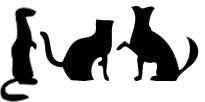Periodontal Disease
/Periodontal disease is very common, yet entirely preventable. This is one of the most common issues we see on a daily basis. It affects all animals canine, feline and even exotics. Lets face it, it's not always "easy" to brush their teeth. Some animals don't mind it, others however, are much less receptive- especially our cats. We recommend starting to brush their teeth at a very young age with the hopes they get used to it. This makes the overall experience much less stressful for everyone involved. Periodontal disease affects more than their "smile", bacteria left on teeth overtime can cause serious issues later in life.
To put it into perspective for you, lets take a minute to think about what would happen if we went 8+ years without ever brushing our teeth-yuck! Over time bacteria grows on the teeth. Plaque develops and adheres to the surface of the tooth and along the gum line. As time passes the plaque hardens, forming dental calculus or tartar. Leaving plaque and calculus on teeth for prolonged periods of time is unhealthy. Bacteria eventually makes it's way up under the gums damaging the tissue that support the tooth.The gums react by receding. An abscess or loss of teeth can occur. In severe cases, if left untreated, bacteria from the teeth can also travel systemically potentially causing issues with organs such as heart, liver, and kidneys.
Signs of periodontal disease consist of more than just bad breath. You will start to notice plaque build up on the teeth, the gum line can become reddened as the plaque begins to irritate the gums. Your animal will resist you examining their mouth because it is uncomfortable, some animals will rub their face on a surface excessively. A tooth abscess is always a possibility when the gum lines have begun to recede. In the most painful cases some animals may even find it difficult to eat.
When the teeth have acquired plaque and tartar unfortunately simply brushing them is not enough. At this stage their teeth will need to be scaled and polished to effectively remove what has grown and built up. For this procedure we sedate them and maintain them under general anesthesia. The dental procedure itself is relatively quick. Any necessary extractions are also done at this time. A very common concern we hear from our pet parents in regards to extractions is; "will they be ok having multiple teeth pulled?" The answer to that is, yes. Believe it or not they will actually feel better after the teeth have been pulled and the gums have healed. Having teeth with receded gums and exposed roots can cause severe discomfort and pain. Dentals are very common and routine, even with our older patients. Pre anesthetic blood work is taken in order to make sure that your animal is a safe and healthy candidate for this procedure.
After having a dental your pet now has a "clean slate". If you maintain your animals teeth via brushing or dental chews you will be able to keep their teeth and gums healthier for longer periods of time. Remember, the recommendation for people is one cleaning per year!
If brushing your animals teeth daily is a difficult task or not something that you always have the time for you can try alternative methods such as giving them hard toys or bones to chew on. We always recommend beef marrow bones (with the fatty marrow plug boiled out) . We also carry a great product called OraVet. OraVet is a chewy treat that is clinically proven to help reduce bad breath, clean the teeth, and prevent bacterial growth.
February is national dental health month so lets get to work and keep those teeth clean. Happy brushing!

